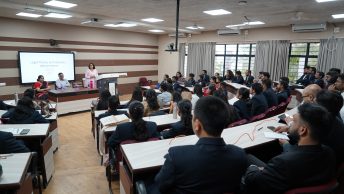The NALSAR Centre for Corporate and Tax Laws had, along with Institute for Law and Philanthropy, Tel Aviv University Law School, organized a workshop on Corporate Social Responsibility in 2019 at NALSAR University of Law. This post presents an overview of the workshop.

India recently adopted a Mandatory CSR (MCSR model) through its Companies Act 2013. The MSCR Model required corporations satisfying specific size or profit thresholds to spend a minimum of 2% of their net profit on CSR aimed at specific targets and social causes. In Israel, as well as many other jurisdictions, CSR and corporate philanthropy go unregulated as they are considered an elective practice, influenced primarily by market considerations.
The two-day workshop comprised seven sessions and engaged around 35 presenters and participants. The participants ranged from students, researchers, legal consultants, corporate executives responsible for MCSR execution and CSR consultants. The participants deliberated on and discussed CSR practices and the impact of corporate giving through philanthropy and MCSR in India and Israel comparatively. The introductory session set the framework and agenda, noting the concentration of wealth and power of corporations, their influence among states, and their status under international law. Although corporate responsibility can be perceived as a global common, it is also necessarily rooted in local cultures, customs and histories. Therefore, while the ‘why’ of CSR continues to be debated, the mandatory approach to CSR adopted in India also requires looking into the ‘what’ and ‘how’ of this new regulation. India’s unique legal framework also offers an opportunity to explore connections between policy, theory and practice, such as whether mandating CSR is perceived in theory and practice as a tax. Whether ‘beyond compliance’ is a relevant concept, and if the legal framework incentivizes better policy formulation and practice or sets a common minimum denominator of CSR.
The second session on the Legal and Regulatory Landscape of MCSR stressed that the underlying objective of mandatory CSR was to promote a culture of inclusive growth and thereby imbibe the principles of Sustainable Development Goals (SDGs) and the National Development Goals. This raised the inevitable question of whether CSR is an attempt to delegate the functions of the state to a private entity. The session brought to light some gaps in regulation as well as some positive trends in practice. For example, companies tend to spend more on CSR if they have direct involvement in the activities; companies with close-knit ownership structures spent more than the ones which were in business groups; CSR activities that addressed local areas saw greater spending when compared to non-local programs.

The third session presented the policy and regulatory framework for corporate philanthropy and corporate responsibility in Israel and its historical development, which was promoted by non-profit organizations. The session also presented some exemplary practices built on collaborations between companies and non-profit organizations.
The fourth session highlighted the practical experience of implementing CSR in India through Trusts and Foundations. It was suggested that CSR spending should lead to creating infrastructure projects that lead to self-sustainability. Such a positive impact may be better achieved if a network of community stakeholders is created and the implementation is performed through a corporate-owned foundation or trust to ensure better control over activities.
The fifth session explored CSR programs in India conducted in-house and their challenges. In the absence of reliable impact assessment criteria, it is difficult for CSR executives to provide concrete and verifiable proof of their claims to stakeholders and, at the same time, creates problems in convincing and negotiating with the internal management about the necessity of CSR spending and areas of spending. Some measures for coping were suggested: Employee engagement showed better results regarding program ownership; NGO high engagement, including participation in board meetings and also board member site visits create mutually beneficial outcomes.
The sixth session explored the connection between social venture and CSR, noting that while, on the one hand, corporations are struggling to identify suitable projects for CSR funding, social ventures and NGOs struggle to find sustainable streams of funding. It is, therefore, crucial that social ventures and NGOs have equal access to capital and diversify their funding sources from government, corporations, trusts and foundations, and self-financing. Policy and regulatory amendments are needed.
The seventh session put the spotlight on connections between CSR and sustainability strategies. Corporation’s role and responsibility include ensuring the social development of the country. This requires looking at the shared value and development priorities of the government and companies’ own manufacturing footprint while designing their CSR program.
The workshop concluded with a collective understanding of the importance of continued deliberations between CSR practitioners and academia to evolve CSR as a discipline, develop multi-disciplinary research and praxis, create a cadre of CSR professionals and support the development of impact assessment practices. It was suggested that NALSAR establish a research centre funded by CSR to facilitate multi-disciplinary engagement and research.
situs toto situs toto toto togel toto slot toto slot link slot gacor slot thailand slot gacor



